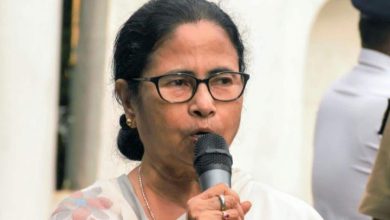In a house race with big names, two women with local ties rise

Two months ago, the megawatt contest for a rare open House seat in New York City seemed destined to be shaped one of a handful of nationally known candidates.
There was a former New York City mayor, an ex-congresswoman, a former federal prosecutor who helped impeach Donald Trump, and even a sitting congressman from the exurbs.
But with the Aug. 23 primary less than three weeks away, the contours of the race have been redefined. Two women with local bona fides but little national stature have surged toward the front of the pack, upending early conventional wisdom and scrambling the race.
In recent public and internal polling for the Democratic primary, Carlina Rivera, a councilwoman from Manhattan, and Yuh-Line Niou, a Manhattan assembly woman, are running neck-and-neck with the two well-resourced men considered heavyweights: Rep. Mondaire Jones, a recent transplant to the drict, and Daniel Goldman, the impeachment investigator, who has never held elective office.
Rivera and Niou have one particularly compelling advantage: They already represent parts of the congressional drict and have proven bases of support among voters and Democratic groups in the area — a likely boon in a late-summer contest where voter turnout and interest are expected to be low.
Indeed, in a brief canvass on Thursday of would-be voters in Rivera’s drict on the Lower East Side, the vast majority said they were not following the race. Campaign signs were almost nonexent — save a couple for Goldman.
But Wilfredo Lopez, a 73-year-old resident walking Hamilton Fish Park, was an exception. He said he was voting for Rivera because “she’s from the neighborhood, and she’s for the neighborhood.”
On the surface, Rivera and Niou have similarities; both are 30-something women of color with far-left roots.
When she was first running for Council, Rivera, a 38-year-old Lower East Side native of Puerto Rican descent, was a dues-paying member of the Democratic Socials of America; her campaign said that she attended only one meeting.
She has since tacked toward the center, resing the anti-development predilections of the left and defining herself as a pragmatic progressive, as someone who gets things done.
Rivera has nonetheless won the support of the progressive Brooklyn political establishment — the borough president, Antonio Reynoso; Nydia Velazquez, the congresswoman whose current drict overlaps with the newly redricted one; and several unions — even as she has also more aggressively courted the real estate sector.
Niou, 39, has never been a DSA member but has retained her far left posture, winning the support of left-leaning organizations like the Working Families Party and Jewish Vote, the political arm of Jews For Racial and Economic Justice.
Since she was elected to the New York state Assembly in 2016, Niou has focused on combating racial discrimination and sexual harassment. In the past six years, she has been the prime sponsor of 15 bills that became law, according to her campaign, including one establishing a toll-free hotline for complaints of workplace sexual harassment.
During the tail end of Andrew Cuomo’s tenure as governor, Niou could sometimes be found sparring with him and his staff. After The New York Times reported on a $25,000-a-couple fundraiser hosted the governor during the legislative session, Niou and two colleagues held a news conference to express their outrage. Cuomo’s spokesman responded calling her and her colleagues “[expletive] idiots.”
During this race, Niou has assiduously courted the left-most flank of the Democratic Party, even expressing support for the Boycott, Divestment and Sanctions movement — a decision that may cost her votes in a drict with a substantial Jewish population.
John Mollenkopf, a political science professor at the CUNY Graduate Center who analyzes voter data, estimated that at least 16% of the primary voters in the 10th Congressional Drict will have Jewish surnames. He said those voters might take issue with Niou’s BDS stance, “partly because there are other quite acceptable candidates to center-left Jewish voters in the race.”
Niou’s and Rivera’s national policy stances are similar: They both champion federal abortion rights; the Green New Deal plan advanced Rep. Alexandria Ocasio-Cortez; and more liberal immigration and refugee policies.
But at the local level, pronounced dinctions have emerged.
Rivera staunchly backs the ongoing effort to tear down and then rebuild East River Park at a higher elevation, to make the neighborhoods it abuts less vulnerable to storms like Hurricane Sandy. Protesters booed Rivera for that stance at a recent environmental forum, but on Monday she won the backing of the forum’s host — the New York League of Conservation Voters.
Niou took issue with the plan to make the area more resilient.
“The city and the way that the city operated raise a lot of questions for me,” Niou said.
In the City Council, Rivera has acted as the first primary sponsor on 25 pieces of legislation that have become law, including a bill requiring restaurants to give bathroom access to delivery workers.
Rivera also supported a bid to build low-income senior housing in a wealthy neighborhood’s community garden, a project codeveloped Habitat for Humanity. Niou sued to stop the development, alienating the former local councilwoman, Margaret Chin, who has endorsed Rivera instead.
“I’m so disappointed in her,” Chin said of Niou.
“Normally I would support an Asian woman, we need more representation, but in this case,” Chin said, trailing off.
Rivera has also backed a bid to allow more density, including affordable housing, in the Manhattan neighborhoods of SoHo and NoHo, an initiative Niou says she had doubts about.
This year’s unusually messy redricting process fundamentally reshaped the 10th Drict. Where the drict once stretched from the Upper West Side of Manhattan to Bensonhurst in Brooklyn, the new map makes it more compact, encompassing only Lower Manhattan and the northwest precincts of Brooklyn.
Jerry Nadler, the congressman now representing the drict, opted to run in the 12th Drict against a longtime colleague, Rep. Carolyn Maloney, after his Upper West Side home base was moved there. The result was a rare open seat in the heart of New York City, and a political gold rush that drew a dozen or so candidates, including Jones, the congressman who currently represents Rockland County and parts of Westchester.
Jones and Goldman are far the race’s best-resourced candidates. At the end of June, Jones had $2.8 million to spend. Goldman had $1 million, though he also has a vast reservoir of personal wealth to draw from and told NY1 he intends to use it. He has up to $253 million in personal wealth, according to Bloomberg News.
“I am extremely grateful for the opportunities I’ve had, and that is why I’ve committed my life to public service,” Goldman said in a statement. “I’m running for Congress to continue that service, to build a better future for all of our children, and to give everyone the opportunity to succeed.”
His financial disclosures with the House, which cover an 18-month period ending June 30, indicate that he has a line of credit from Goldman Sachs worth up to $50 million, and hundreds of investments, including in weapons manufacturer Sturm, Ruger & Co.; in oil companies, including Chevron and Exxon Mobil; and even in Fox Corp.
A spokesman for Goldman said he will put his assets into a blind trust upon entering Congress, as he has done in the past, and that he has such a wide breadth of investments because his portfolio is structured to mirror the S&P 500.
“How the hell can this guy claim to believe our democracy faces a five-alarm fire, and to care about public safety, when he’s got investments in Fox News and deadly gun manufacturers?” Jones said in a statement. (On Friday, after the article had published online, Goldman’s spokesman said that the former prosecutor no longer holds any stock in Sturm, Ruger and Co.)
Goldman’s paid role as a legal analyst on MSNBC, and his time as an impeachment prosecutor have won him supporters, including Joan Manzioni, a 67-year-old restaurateur who on Thursday said she was considering voting for Goldman or Elizabeth Holtzman.
Goldman and Jones are the only two candidates with television ads, according to Ad Impact, an advertising analytics firm. As of Thursday, Goldman had spent $2.2 million on television, while Jones had spent $684,000.
The third presumed heavyweight, former Mayor Bill de Blasio, dropped out of the race in July, citing his inability to sway voters. Holtzman, the former congresswoman, is doing better than expected in some of the polls, but is far behind in fundraising and is combating doubts about her age, 80.
As of late June, Niou had $202,000 on hand; Rivera had $354,000. In an effort to compete financially with Jones and Goldman, Rivera has raised money from major developers, including the CEO of Two Trees, which is based in the Brooklyn neighborhood of Dumbo. In recent weeks, she has reached out to at least two other executives in the real estate industry for donations, according to recipients of her outreach.
And, in apparent expectation of super PAC support, she has also put a so-called “red box” on her website, which candidates use to communicate indirectly with super PACs.





